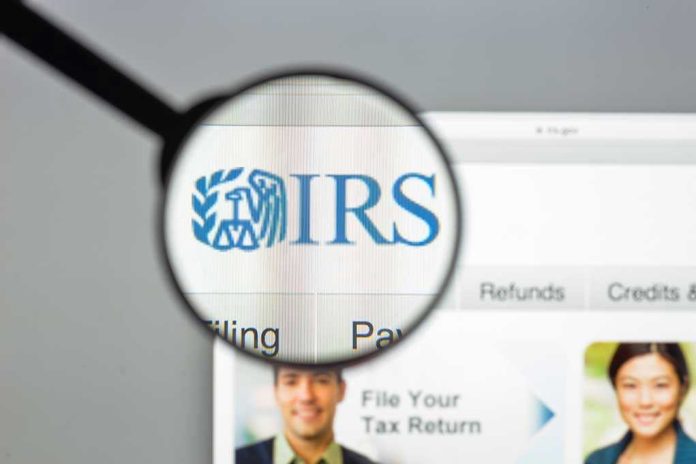
The Trump administration’s sweeping IRS overhaul is set to shake up the nonprofit world, igniting fierce debate over whether new audit protocols will target left-leaning groups and threaten the political neutrality of America’s tax system.
Story Snapshot
- Trump’s IRS overhaul, enabled by the “One Big Beautiful Bill Act,” introduces new audit selection criteria with a focus on nonprofits.
- Critics warn of possible politicization, with increased scrutiny likely for progressive and left-leaning advocacy groups.
- Supporters claim reforms will enhance tax compliance and restore fairness after years of perceived bias.
- IRS implementation is ongoing, with phased changes expected through the 2026 tax year.
Trump’s IRS Overhaul: Legislative Origins and Political Context
The July 2025 signing of the “One Big Beautiful Bill Act” marked a major turning point for federal tax policy and IRS enforcement. This legislation extended key provisions from the 2017 tax reform, while mandating a comprehensive overhaul of IRS operations. The Trump administration cited a need to restore balance and accountability, highlighting past controversies—such as the 2013 IRS scandal involving conservative groups—as justification for new audit selection protocols. The reforms quickly gained attention for their potential impact on the nonprofit sector, especially organizations with progressive advocacy missions.
IRS and Treasury officials moved swiftly after the law’s passage, launching a phased implementation plan beginning August 2025. Early statements confirmed that individual tax returns and withholding tables would remain unchanged for 2025, but nonprofit organizations would face revised reporting and audit requirements in coming years. The new IRS CEO, appointed during a government shutdown, signaled high-level urgency and direct White House involvement. Stakeholder consultations and technical guidance are continuing, with major overhaul components set for rollout in tax year 2026.
Audit Algorithms, Political Scrutiny, and Stakeholder Tensions
Central to the controversy is the overhaul of the IRS’s audit selection algorithms and enforcement priorities. The new approach, as outlined in administration and IRS releases, emphasizes increased scrutiny of nonprofit and advocacy groups. Critics argue that the changes are designed to disproportionately target left-leaning organizations, raising alarm over the risk of politicized tax enforcement. Supporters counter that reforms address long-standing imbalances and will deter abuses of tax-exempt status. Congressional oversight has intensified, with Democrats warning of selective enforcement and conservatives demanding greater transparency and integrity in nonprofit tax compliance.
Nonprofit leaders and tax professionals are already reporting heightened uncertainty, as the prospect of more frequent audits may have a chilling effect on advocacy and public engagement. Legal analysts note that, depending on the specific criteria embedded in the audit algorithms, some groups may face disproportionate scrutiny. Historical concerns persist, with echoes of the 2013 scandal and ongoing calls for safeguards to maintain the IRS’s political neutrality.
Implementation Timeline, Legal Challenges, and Future Outlook
The IRS and Treasury have stressed transition relief and broad stakeholder engagement to avoid abrupt disruptions. While the agency is currently drafting new guidance for the 2026 tax year, the lack of detailed public documentation on the audit algorithm changes fuels ongoing speculation and concern. The nonprofit sector, especially those with progressive or advocacy missions, is bracing for increased compliance costs and possible legal battles. Tax professionals are adapting advisory practices to account for the new enforcement environment, while Congress remains sharply divided on the reforms’ intent and impact.
Exclusive | Trump Team Plans IRS Overhaul to Enable Pursuit of Left-Leaning Groups – WSJ https://t.co/A9mVgJDYLm
— TB (@Iamnottommyb) October 16, 2025
Expert commentary remains split: some see the reforms as necessary corrections to restore fairness in IRS enforcement, while others warn of constitutional risks if the agency’s actions are shown to be politically motivated. All sides agree that the stakes are high, with the integrity of both the IRS and America’s nonprofit sector hanging in the balance. As administrative changes continue through late 2025 and into 2026, the true impact of Trump’s IRS overhaul—and its implications for political advocacy, tax fairness, and constitutional rights—will come into sharper focus.
Sources:
Tax Brackets: What They Are, How They Work, and Examples
IRS releases tax inflation adjustments for tax year 2025
One Big Beautiful Bill provisions
Treasury taps IRS CEO as agency navigates overhaul during shutdown
Analysis of the 2025 Federal Tax Changes Under the One Big Beautiful Bill Legislation



